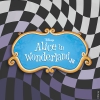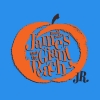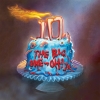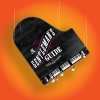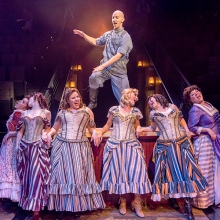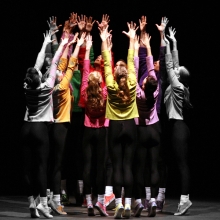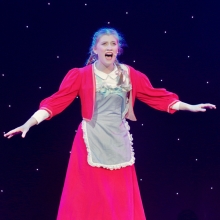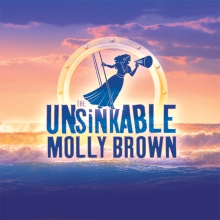Filichia Features: Urinetown Downtown, Courtesy of Amas

Filichia Features: Urinetown Downtown, Courtesy of Amas
“When people are singing and dancing, it’s much harder for them to hate each other.”
So said Donna Trinkoff, the artistic producer of Amas Musical Theatre before a recent performance of Urinetown in New York City.
Trinkoff didn’t take credit for the truth-filled line, but fully admitted that it came from Rosetta LeNoire (1911-2002), the founder of Amas. If the name isn’t quite familiar, the face would be to those who watched Family Matters during the ‘90s on ABC and then CBS; LeNoire played Estelle “Mother” Winslow and appeared on most of the series’ episodes.
Long before that, however, when LeNoire was halfway through her 45-year Broadway career, she knew full well that inner city kids could avoid getting into terrible trouble if they got on stage. Now, a full 45 years later, Trinkoff is still keeping alive The Rosetta LeNoire Musical Theatre Academy at The Theatre at the 14th Street Y.
Amas recently did a musical whose title doesn’t suggest a children’s show. It’s certainly not Pippi Longstocking Goes to the Store (or whatever Pippi’s been doing lately). Kids l-o-v-e to do “grown-up shows,” and Urinetown certainly sounds like one, doesn’t it?
“Live long enough and you see everything,” says its anti-hero Caldwell B. Cladwell. Yes – and that includes a musical called Urinetown, the biggest Broadway musical hit to be saddled with the most unlikely title and still be the world’s most entertaining and amusing agit-prop musical.
Who’d have expected that this show would win a Tony for Best Book (for Greg Kotis) and Best Score (for Kotis and Mark Hollmann)? About a year before Urinetown began its odyssey to Broadway, I was at an opening night party which was suddenly interrupted by the artistic director’s loudly clapping his hands in order to get our attention. After we gave it to him, he told us about the arduous life he had: “You get scripts in the mail with titles like Urinetown.” He then dropped the script into a wastebasket, where it made a loud THUD.
(That artistic director has, I assumed, since learned that you can’t judge a script by its title.)
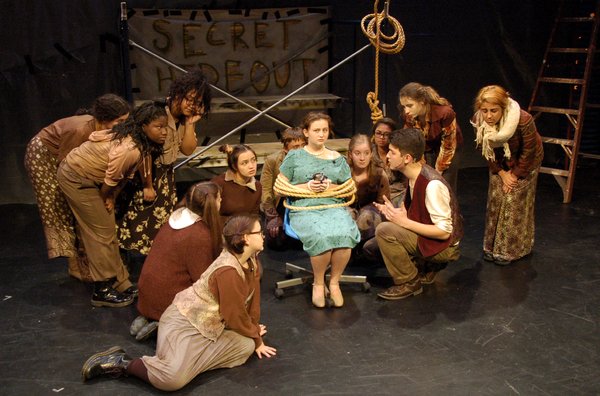
Emily Viega and the cast of Urinetown at Amas Musical Theatre.
In addition to its title, Urinetown had quite a bit going against it. After a promising start at a 1999 fringe festival, the best theater it could afford was one that is generally conceded to be one of the town’s dumpiest. As a result, there are producers who, still smarting from its lumpy and rickety seats, won’t go there. That cut down on the show’s chances of making it to Broadway.
But make it to Broadway it did. How well I remember the excitement at the performance I attended on Monday, September 10, 2001. We all left the theater on a glorious high after seeing the edited and polished version of the show. Surely after the critics attended the opening the following night, the Wednesday reviews would proclaim September 11, 2001 as a glorious day in Broadway history.
It certainly didn’t turn out to be a great day in American history. There was, of course, no performance on Broadway on what is now globally known as 9/11. There were neither matinees nor evening performances on September 12, either.
All Broadway productions resumed on Thursday, September 13, including Urinetown, which finally opened on September 20, 2001 at the theatre then known as the Henry Miller’s (and now known as the Stephen Sondheim).
The New York critics certainly responded. “Sensational” (Times). “Wild and happy” (Post). “Exciting” (Observer). “Remarkably successful” (The New Yorker).
So started a 965-performance run, but even that could have been bettered had it not been for more bad luck. The Henry Miller’s Theatre had to be closed because a mammoth skyscraper was to be built above it. Moving even a simple set to a new theater was deemed too costly for a show that had been around for more than two years.
But Urinetown continues to play here, there and everywhere – including Germany, where it was called Pinkelstadt, and here at the LeNoire Academy.
Kotis’ book takes us to a future when relieving oneself is hard if you’re on relief. Everyone’s told “It’s a privilege to pee,” but a more accurate statement would be “Only the privileged can afford to.” Each toilet in the land – apparently even in private residences – costs money.
Amas’ kids are too young to have experienced pay toilets, which began annoying the American public in 1910 and stayed around for about 60 more years. But the LeNoire Academy tweens and teens can identify with the agonized characters and know how to play this desperation, for they’ve been on the streets of New York when nature has called, only to have restaurateurs curtly turn them away.
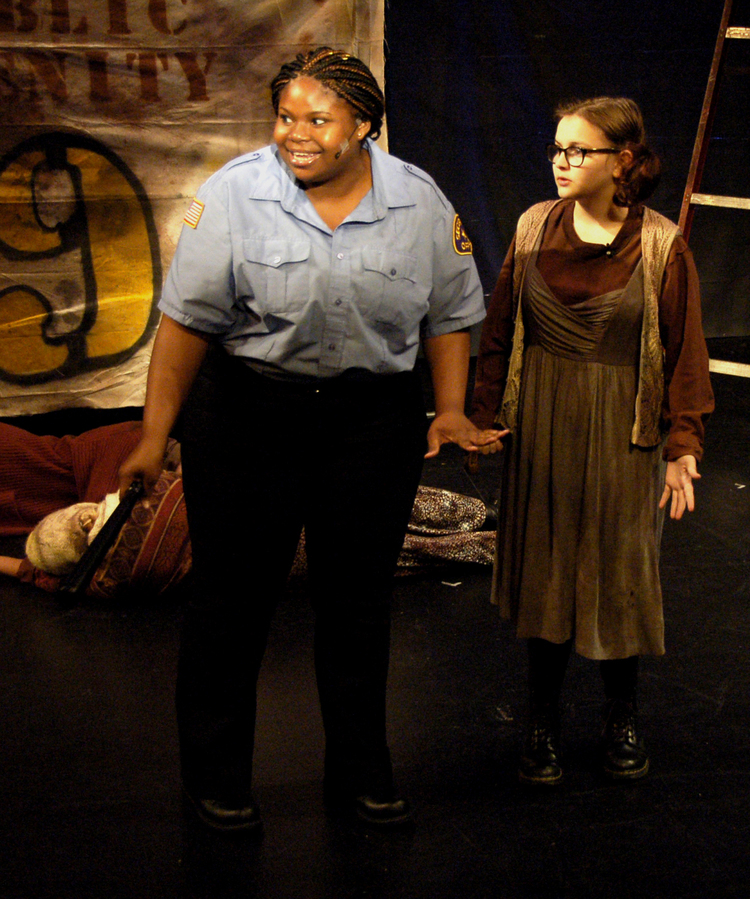
Sheika Murray and Molly Viega in Urinetown at Amas Musical Theatre.
Urinetown’s plot involves class distinction. Bobby Strong is an impoverished workaday but Hope Cladwell – the daughter of the CEO of Urine Good Company (which controls the pay toilets), is – you should pardon the expression – flush. How can love survive? It can’t – because one of them literally doesn’t.
The conventional wisdom says that tween and teen audiences won’t sit still for love ballads. That would go twice for Urinetown’s “Follow Your Heart,” for it’s a waltz, which is about as uncontemporary as a ballad can be.
And yet as Isabella Rivera and Benjamin Miller beautifully delivered it, I glanced behind me to check out the young audience members. They weren’t eye-rolling in when-will-this-be-over anguish but were indeed listening and perhaps even relating to two young people being heartfelt with each other against parental odds.
True, plenty in the audience had to be friends of cast members, so they came to clap. Ah, but after each song, they didn’t expect to clap this hard. The magic of musical theater and Urinetown’s inherent worth caused the lagniappe. When a chorus member had his or her chance to step forward and sing a single line, each of them confidently moved into place.
Christopher Scott has been staging LeNoire Academy shows for more than two decades, and his vast experience was evident. He’d taught every ensemble member that he or she isn’t a stick of wood or window dressing: there was a person underneath those ragamuffin clothes, and each kid had a responsibility to find that character.
So as Caldwell B. Cladwell, Quincy Rodriguez suggested that he’d been watching Donald Trump in his political or reality show TV appearances. Sheika Murray was a fantastic fascist, the by-the-book Officer Lockstock. She showed that she could easily maneuver a 180-degree turn from the Dolly Levi that she did so admirably at Amas a couple of seasons ago.
A musical about distressed people mostly requires distressed scenery and costumes that have seen better days and shows. Fashion experts say that if you haven’t worn a certain piece of clothing in a year, you’ll probably never wear it. So if your troupe is doing Urinetown, remove those clothes from the back of your closet and put them on stage. Don’t remove even a speck of accumulated dust.
So Urinetown is a natural for a bare-bones production. But was Josh Iacovelli, credited with set design, the one who came up with the whimsical, creative and inexpensive idea for the laptop that Cladwell often opened and closed? Neither a product from Apple nor Microsoft was sitting prominently on his desk, but rather a toilet seat.
Urinetown often urges its characters to “Get your head out of the clouds.” But in a way, the kids in The Rosetta LeNoire Musical Theatre Academy couldn’t help having their heads reach the clouds – because in doing the show, they stood so tall.
You may e-mail Peter at pfilichia@aol.com. Check out his weekly column each Monday at www.broadwayselect.com and Tuesday at www.masterworksbroadway.com. His book The Great Parade: Broadway’s Astonishing, Never-To-Be Forgotten 1963-1964 Season is now available at www.amazon.com.
Share
Callboard
-
Shake and shimmy it with the #Hairspray20Challenge! Join MTI and Broadway Media in celebrating 20 years of #Hairspray. Duet this here or find us on TikTok! Special thanks to @broadwaymedia and @jammyprod. Choreography Guides are a licensor official resource that provides step-by-step instruction from Broadway and professional choreographers for your productions! Visit @broadwaymedia to learn more. #mtishows #youcantstopthebeat #hairspraymusical #goodmorningbaltimore
View on Instagram


